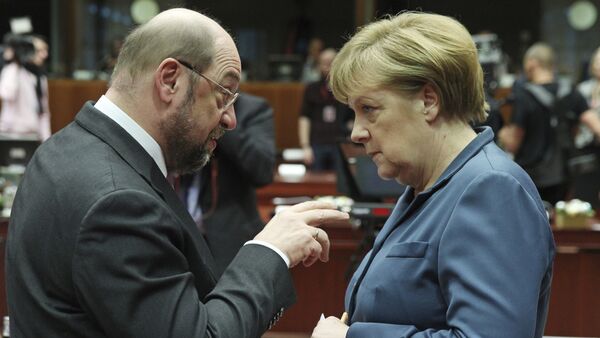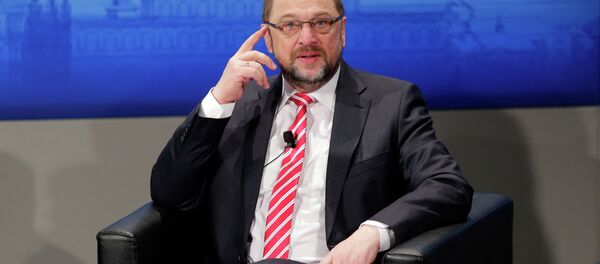Migration and Refugee Crisis
The migration issue could become one of the most serious bones of contention between German Chancellor Angela Merkel's CDU/CSU alliance and Martin Schulz's SPD.
The CSU, the Bavarian sister party of Angela Merkel's governing CDU party, has long been known for its tough stance on immigration: not only have its members repeatedly criticized Merkel for her open door migration policy, they were also the ones who pushed through an annual cap on the number of refugees entering the country.
Although the CDU itself had a much softer approach toward the migration issue, the rising criticism toward Merkel's refugee strategy among German residents forced the party to alter its migration-friendly approach.
READ MORE: Less Benefits, More Check-Ups: Germany's CSU Demands Tougher Stance on Refugees
Now, the CDU backs its CSU sister party in pursuing a tougher stance towards asylum seekers, including more thorough check-ups and a reduction in financial benefits for newcomers. The alliance also welcomes deportations and introduces financial incentives to urge asylum seekers leave the country.
Such a stance collides with the political course of the center-left SPD which believes that the right to asylum must remain untouched. In particular, the party has repeatedly stressed that the right for reunification of refugees with their families must be respected, and has sought to ensure financial support for countries that agree to accept migrants from the EU budget.
Although both parties support the idea of deeper EU integration, they have different opinions on how far it should go.
The leader of the Social Democrats, Martin Schulz, seeks to transform the European Union into the so-called "United States of Europe" with a common constitution.
The ambitious integration project reflects the idea of a "Multi-speed Europe", which was proposed by French President Emmanuel Macron.
READ MORE: 'United States of Europe': Throwing Disobedient EU Countries Overboard
Although this initiative could theoretically improve Europe's position in an increasingly competitive world, it would certainly affect state sovereignty. The latter raises strong opposition among quite a large number of EU member-states, including the countries of the Visegrad group.
Merkel's CDU, on the other hand, has a rather cautious stance when it comes to reforms affecting European institutions. Strong criticism against further European integration based on Schulz's model has also been voiced by the Bavarian CSU.
Health Care and Social Benefits
Difficulties during the talks may arise when it comes to the differing health care visions of the SPD and the CSU.
The Social Democrats want to overhaul the German health insurance system, and create a so called "citizen's insurance," which will be common for all the country's residents.
In this way, the SPD hopes to eliminate the country's existing health care system, which currently includes two types of insurances: statutory and private ones.
The CDU/CSU alliance is strongly against this idea.
Military Expenditure
Another point of disagreement between the parties is the amount Germany spends on defense and the extent to which the country should focus on the military.
During summer of 2017, SPD leader Martin Schulz claimed that "the CDU does not see any problem in spending 20 to 30 billion euros per year on armaments and cutting social benefits instead."
The conservative bloc has repeatedly stated that they want to eventually reach the NATO target of spending two percent of GDP for military purposes.
The SPD rejected the idea, demanding more attention to social aspects. Although the Social Democrats do not oppose an increase in military spending as such, they consider NATO's demands "completely unnecessary and unrealistic," preferring to spend money on humanitarian aid and sustainable development.
Political Crisis
Commenting on the current political situation in the country, German President Frank-Walter Steinmeier said that "we are now facing a situation that has never happened before in the history of the Federal Republic of Germany, that is for almost 70 years."
If the parties want to form a new grand coalition, they will somehow have to find a consensus on all of these issues. Otherwise, the failure of the talks might lead to snap elections in the best case scenario, or to political turmoil within the country in the worst.
READ MORE: German Coalition Talks Collapse: Snap Elections Loom Amid Unprecedented Crisis
Germany is now witnessing a political crisis, as talks to form a new government collapsed in November 2017 after the Free Democratic Party (FDP) withdrew from negotiations on forming the so called "Jamaica coalition" with the CDU/CSU and the Greens.
German Chancellor Angela Merkel's party is now trying to renew a grand coalition with the Social Democrats, but so far the talks haven't brought about much success. A new round of talks is set to take place on Sunday.





